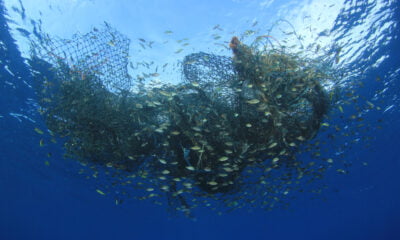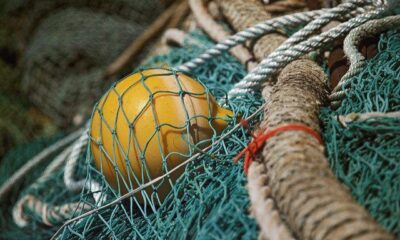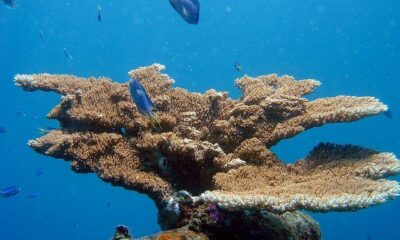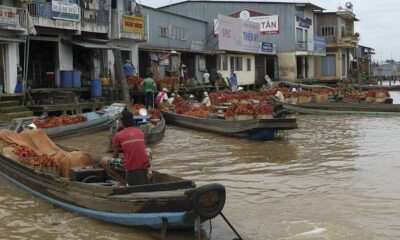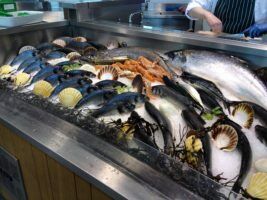

Environment
Recent Report shows Accelerated growth in the Sustainable Seafood Supply Chain
The Marine Stewardship Council (MSC) today published its 2015-16 Annual Report, highlighting market engagement and growth in MSC certified fisheries and supply chain, as MSC certified catch nears 10 million tonnes.
The report, from sustainable fishers to seafood lovers, showcases the organisations and individuals driving change from ocean to plate.
The volume of MSC certified catch has increased by six percent since 2014-15, while the MSC certified supply chain has climbed 16% over the same period. Between April 2015 and March 2016, the number of processors, restaurants and caterers with MSC Chain of Custody grew from 2,879 to 3,334 companies, operating in 37,121 sites across 82 countries. More than 20,000 products now carry the blue MSC label and can be traced back to fisheries which meet the MSC’s world-class standard for sustainable fishing.
“Accelerated growth in the MSC certified supply chain, and more MSC labelled products, demonstrate a growing demand for traceable, sustainable seafood,” says MSC CEO, Rupert Howes.
More retailers and brands are choosing to use the MSC label to communicate their commitment to sustainability.
“Their leadership is helping to drive a chain reaction, from ocean to plate. From certified fishers to seafood consumers, everyone plays a vital part in ensuring that our oceans are thriving for generations to come.”
A growing market
The MSC’s report highlights just some of the commitments made by leading retailers. They include Lidl Germany’s extended range of MSC labelled products, along with initiatives from Sainsbury’s, Carrefour, Migros, Coles and Aeon. The MSC’s 2016 consumer study also shows that sustainability is a key driver for seafood purchase, and consumers are prepared to change shopping habits to protect the oceans.
“The MSC provides a mechanism that serves to galvanize a diverse community of change-makers which is driving real and lasting impacts on the water. Thanks to our partners whose dedication is contributing to healthy oceans, now and for the future,” adds Mr Howes.
Impact on the water
MSC certified fisheries caught more than 9.3 million metric tonnes of seafood in 2015-16*, representing almost 10% of the total global wild caught seafood by volume. MSC data shows that 83% (2.6 million tonnes) of seafood caught in the Northeast Pacific and 40% (3 million tonnes) of wild catch in the Northeast Atlantic is now MSC certified. As of 31 March 2016, 286 fisheries were MSC certified.
There were 38 newly certified fisheries in 2015-16 including some significant firsts: the Spanish Asturian fishing guilds became the first octopus fishery to gain MSC certification, while the China Southern Fishing Company was the first MSC certified tuna fishery in China. Canada also realised a major milestone with certification of the country’s first Atlantic cod stock. Certification of the 3Ps cod fishery marks a new chapter in the history of cod in Canada.
Alaska Pollock – one of only 10 fisheries worldwide to have been certified three times – along with African hake, Antarctic krill and Norway’s North East Arctic cod and haddock fishery were recertified in 2015. All over the world, MSC certified fisheries are delivering measurable, positive impacts in our oceans, from reducing bycatch to advancing scientific understanding of marine environments. MSC data show that over the course of their certification, 94% of certified fisheries are required to make at least one improvement to maintain their certificate.
“Increasing accessibility of the MSC program to developing world and small-scale fisheries is also critical to achieving our mission,” says Mr Howes. “The MSC’s Global Fisheries Sustainability Fund, along with new tools and initiatives are aimed are helping more fisheries take their first steps on the road to environmental improvements.”
Tuna: a global resource
The report also highlights major tuna developments. The Indian Ocean Tuna Commission’s decision to adopt harvest control rules for skipjack tuna was a ground-breaking moment for tuna fisheries globally. The proposal came from the Maldives – the first country in the region to achieve MSC certification for its pole and line tuna fishery. It is hoped that this leadership will pave the way for increased collaboration in the management of other tuna stocks.
Growing demand for MSC certified tuna – which now represents 16% of the global tuna catch – is also reflected in John West Australia’s bold step to overhaul its supply chain to bring the country the world’s largest offering of MSC labelled canned tuna. Today, 97% of the company’s supply comes from the MSC certified PNA tuna fishery, which this year achieved certification of its yellowfin catch, accounting for half of all yellowfin caught within PNA waters.


 Environment12 months ago
Environment12 months agoAre Polymer Banknotes: an Eco-Friendly Trend or a Groundswell?

 Features11 months ago
Features11 months agoEco-Friendly Cryptocurrencies: Sustainable Investment Choices

 Features12 months ago
Features12 months agoEco-Friendly Crypto Traders Must Find the Right Exchange

 Energy11 months ago
Energy11 months agoThe Growing Role of Solar Panels in Ireland’s Energy Future
